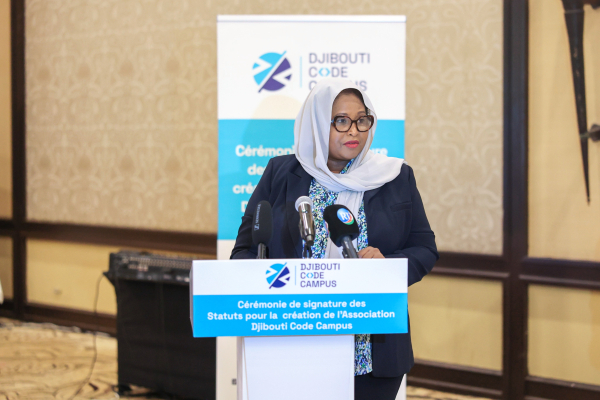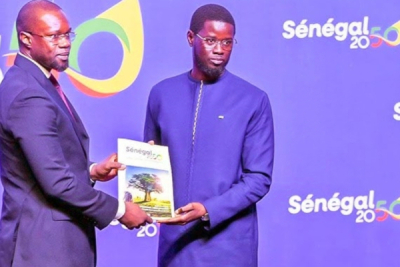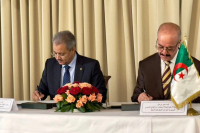
Tech (802)
The government is committed to transforming Djibouti into a digital powerhouse by 2035. Recognizing that young people are essential to this transition, they are investing heavily in developing technological skills among the youth population.
Djibouti is set to launch a new coding and IT school, the Djibouti Code Campus (DCC), aimed at equipping young people with the skills needed for the digital age. The official signing of the school's statutes took place on Sunday, October 13, under the patronage of Mariam Hamadou Ali, Minister of Digital Economy and Innovation.
In her speech, Minister Ali highlighted the importance of this initiative for Djibouti's future development. "A nation's progress is primarily driven by its human capital. By training experts in cutting-edge technologies, we are empowering our youth to actively contribute to Djibouti's prosperity and modernization," she said.
The DCC aligns with the government's "Smart Nation" strategy, which seeks to transform Djibouti into a digital hub in East Africa. Inspired by the renowned Ecole 42 programming school, the DCC will employ an innovative approach focused on project-based learning, autonomy, and collaboration. This method has proven successful in major cities worldwide, with job placement rates exceeding 90%.
Supported by the private sector and international partners, the DCC will offer free, accessible training in high-demand skills like coding and artificial intelligence. This initiative aims to bridge the digital divide, improve youth employability, and encourage entrepreneurship. By investing in this innovative educational model, Djibouti is positioning its youth to play a key role in the global digital economy and fostering the country's modernization and economic growth.
Djibouti is targeting digital emergence by 2035. According to the "Measuring Digital Development – ICT Development Index 2024" published by the International Telecommunication Union (ITU), Djibouti scored 61.6 out of 100 on ICT development in 2024. This ranking placed Djibouti 17th in Africa out of 45 countries, with Libya leading the continent at 88.1 points. Djibouti's score was above the regional average, demonstrating its efforts to strengthen its digital sector.
Samira Njoya
The Senegalese government is embracing artificial intelligence as a powerful tool for driving development across all sectors. As part of its strategy, the government is exploring the establishment of a dedicated AI computing center, along with other initiatives.
The Senegalese Ministry of Communication, Telecommunications, and Digital Economy, in partnership with the French Embassy and AI HUB Senegal, has launched a seed fund of 59 million CFA francs (approximately $98,222) to support the development of artificial intelligence (AI)-based solutions. The call for applications, unveiled on Saturday, October 12, is open until Tuesday, October 15.
As part of this initiative, grants ranging from €5,000 ($5,466) to €10,000 will be awarded to Senegalese entrepreneurs across various sectors. These include agriculture, education, energy, e-commerce, finance, healthcare, business services, transportation, and more.
In the application form, entrepreneurs are asked to explain how their solutions stand out from those already available on the market. "This could involve aspects such as the use of advanced technologies, a novel approach to solving a problem, an innovative production or service delivery method, or significant added value that addresses an unmet need."
This initiative aligns with ongoing efforts by the Senegalese government to accelerate the development of artificial intelligence. For example, the government is considering building an AI computing center in partnership with U.S. tech giant Meta. This project, discussed in September during the 79th United Nations General Assembly, fits within Senegal’s new digital transformation strategy, SN 2034, known as the "Technological New Deal." Through the fourth pillar of this strategy, the government aims to create a conducive environment for technological innovation and entrepreneurship.
According to a study from the *International Journal of Science and Research Archive*, the integration of AI technologies allows small and medium-sized enterprises to leverage data for informed decision-making, enhance operational efficiency, and tailor customer experiences. In agriculture, for example, the Global System for Mobile Communications Association (GSMA) notes that "AI tools can provide real-time data, perform predictive analytics, and execute algorithms to optimize farming practices, improve crop yields, enhance product quality, facilitate access to markets and credit, and reduce production costs."
Isaac K. Kassouwi
In recent years, the digital sector has become a key contributor to Senegal's economic and social development. In the coming years, the government plans to intensify its efforts and fully capitalize on the opportunities offered by this rapidly growing industry.
Senegal On Monday, October 14, officially presented its national development plan for 2050. Titled ‘Senegal 2050,’ the plan outlines the country’s path to economic transformation. Digital technologies play a key part in this path.
"Today, digital technology is revolutionizing the global economy. Our goal is to make it the driving force behind Senegal's future economy by promoting widespread adoption. This will enhance daily life, stimulate economic growth, and strengthen governance," said Victor Ndiaye, CEO of the consulting firm Performances Group and co-author of the national development plan.
Over the next 25 years, Senegal aims to digitize all sectors of its economy. Priorities include the digitization of land and real estate, an initiative designed to enhance fairness in land access and improve tax justice. Additionally, a reliable digital identity system will be implemented to allow citizens to easily connect to various online services.
The development of quality infrastructure, such as campuses dedicated to innovation and training, along with robust digital networks, is also at the heart of this strategy. The plan includes the creation of new smart cities, which will serve as hubs for technological and economic development.
In terms of human capital, the document emphasizes the creation of a dynamic ecosystem of economic activities and small and medium-sized enterprises (SMEs), supported by three to four key growth sectors. These sectors will be driven by local champions aiming to produce high value-added goods for export.
Education and training will be central to this digital transformation. Schools, universities, and training centers will integrate advanced technology learning into their curricula, preparing all Senegalese to participate in the new digital economy.
The implementation of these projects will be detailed in the national digital strategy, the "Technological New Deal," currently under development. This plan will outline the concrete steps to achieve these ambitious goals. The ultimate objective is to ensure an inclusive and sustainable digital transformation, positioning Senegal among the region's most advanced economies by 2050.
Samira Njoya
Like many African countries, Algeria is striving to improve living standards and modernize its infrastructure. The launch of an instant payment system is part of these efforts to achieve sustainable prosperity and enhance financial inclusion.
Algeria plans an instant electronic payment system in the coming months, according to Nabil Dahia, Deputy Director General of the Interbank Pre-Clearing Center (CPI). The announcement was made during the International Conference on Digital Payments, organized last week by the Algerian Ministry of Finance and the Bank of Algeria, in partnership with the Arab Monetary Fund (AMF).
"Bank of Algeria is preparing the launch of the instant payment system project to achieve strategic goals related to financial inclusion, improve access to payment services, and reduce the costs and risks associated with transactions," said Nabil Dahia.
The upcoming system will allow financial transactions to be completed online instantly, enabling merchants to receive payment amounts immediately. Currently, funds paid by customers are credited to the merchant’s account after a delay of up to 72 hours. This marks a significant step forward in banking services, aiming to streamline payments and facilitate transactions.
This initiative is part of the government’s broader efforts to promote the adoption of electronic payments and the widespread use of digital banking services. It also aims to accelerate the digitization of commercial transactions and boost financial inclusion by making modern payment services more accessible to all citizens, including the unbanked.
These efforts are already yielding results, as shown by the latest report from the International Telecommunication Union (ITU) on ICT development. Published in June, the report awarded Algeria a score of 80.9 out of 100, a significant increase from the 77.8 points it received in 2023. This improvement reflects the government’s concrete actions to modernize its digital infrastructure and enhance access to ICTs.
The launch of the instant payment system is expected to bolster the country's competitiveness in the digital economy, simplify transactions for businesses and individuals, and contribute to reducing cash usage. It could also pave the way for further banking innovations, such as mobile wallet integration and the expansion of inclusive financial services, particularly for rural populations.
Samira Njoya
ICTs are at the heart of digital transformation, which has become a major priority for many African governments. To achieve their goals more quickly, states are relying on partnerships and mutual collaborations.
Côte d'Ivoire and Guinea, on Friday, October 11, signed two memorandums of understanding to accelerate their respective digital transformations. Signed by Kalil Konaté, Ivorian Minister of Digital Transition and Digitalization (photo, left), and Rose Pola Pricemou, Guinean Minister of Posts, Telecommunications, and the Digital Economy (photo, right), the agreement is the result of extensive negotiations, Guinea announced in an official statement.
“This agreement, the result of extensive negotiations, aims to strengthen cooperation and pool expertise in several strategic digital sectors, including fiber optic interconnection, collaboration in postal services, and the sharing of skills in telecommunications and digital technologies,” the statement reads.
In addition to physically interconnecting infrastructures, the agreement outlines plans to develop innovative digital services, enhance cybersecurity, and promote digital inclusion. Pilot projects are planned in smart agriculture, digital health, and online education.
This initiative is part of a broader regional effort to deepen digital integration in West Africa, with the ambition of creating a single digital market. It supports the modernization efforts of both countries across various sectors while encouraging the development of robust telecommunications infrastructure and improving digital services.
The cooperation is expected to improve the quality and coverage of connectivity services in both countries. According to the latest official data, Guinea has 13.4 million mobile subscribers and 7.7 million Internet users out of a population of approximately 15 million. In Côte d'Ivoire, mobile phone penetration stands at 172.2%, while Internet penetration reaches 93.7%, according to the Telecommunications Regulatory Authority (ARTCI).
Samira Njoya
The International Telecommunication Union (ITU) ranks Seychelles as one of Africa's most technologically advanced nations. However, the organization stresses the need for continued advancements in cybersecurity.
On Wednesday, October 9, Seychelles approved the necessary steps to join the Budapest Convention on Cybercrime. As part of this process, it was also recommended to make minor adjustments to the country's Computer and Cybercrimes Act (CRCA) to refine definitions, improve procedural laws, and enhance international cooperation.
"The Budapest Convention is considered as the most modern convention that helps all countries to fight against Cybercrime. By being part of the Budapest Convention, it will give us access to higher levels of international cooperation, which will put us as a country on par, in line with international standards," stated Ahmed Afif, Vice President of Seychelles.
This initiative aligns Seychelles' legal framework on cybersecurity with international norms, as outlined in its National Cybersecurity Strategy 2019-2024. Through this strategy, the government aims to make the country more resilient to cyber threats, ensuring continued use of ICT to foster economic and social development.
Seychelles is the third most advanced African country in ICT development, according to the International Telecommunication Union's (ITU) Measuring Digital Development – ICT Development Index 2024, published in late June 2024. The country achieved a score of 84.7 out of 100, just 3.4 points behind the leader, Morocco. The average score across Africa (47 countries) was 50.3 points.
However, in terms of cybersecurity, Seychelles ranks in the "Evolving" category alongside 20 other African nations, according to the Global Cybersecurity Index 2024 (GCI) by the ITU, released in September 2024. The country excels in legal measures and cooperation but has notable gaps in technical, organizational, and capacity development areas.
Isaac K. Kassouwi
Like many African nations, Mauritania and Algeria have made digital technology central to their economic development. However, to successfully achieve digital transformation, these countries must bolster their cybersecurity efforts.
On Tuesday, October 8, Algeria's National Authority for the Protection of Personal Data (ANPDP) and its Mauritanian counterpart signed a partnership agreement to strengthen their cooperation through the exchange of experiences and expertise in personal data protection.
"This agreement will establish an ideal framework for cooperation in personal data protection, leading to important decisions and recommendations," stated Samir Bourehil (photo, right), president of the ANPDP.
This partnership is expected to enhance the cybersecurity of both Mauritania and Algeria, as these countries place digital transformation at the center of their economic development. The agreement comes at a time of rapid growth in digital commerce, where data flows are increasingly crossing national borders, according to the World Bank.
"Crossborder remittances or cross-border e-commerce requires consistent rules across countries to provide similar level of consumer protection. Reaching regional consensus on data protection standards is needed to ensure compatibility and avoid fragmentation," the Bretton Woods institution noted in its report Regulating Digital Data in Africa, published in May 2024.
Isaac K. Kassouwi
The development of e-health in Africa is expected to facilitate access to healthcare for millions of people, even in remote areas. Although the continent lags behind, it is making every effort to bridge this technological gap and improve its healthcare systems.
Togo recently launched the construction of a National Center for Digital Health (CNSD) in its capital; Lomé. Funded by the United Nations Development Programme (UNDP), this initiative aims to improve healthcare accessibility through the use of new technologies.
"The National Center for Digital Health will oversee the operational governance of digital health activities by establishing key elements such as interoperability and project compliance, as well as gathering health data to support epidemiological surveillance," said Aristide Afèignindou Gnassingbé, Minister Health Advisor, Permanent Mission of Togo to the UN in Geneva, and National Coordinator for Digital Health in Togo.
The CNSD launch aligns with the Togo Digital 2025 national strategy. This project, announced in the wake of the Covid-19 pandemic, highlights the importance of integrating ICT into the healthcare sector. Among the planned innovations is telemedicine, a crucial branch of digital health that has become an essential tool. It will facilitate teleconsultation, tele-expertise, remote monitoring, and tele-ultrasound services.
The center is also expected to serve as a platform for developing digital health solutions, strengthening the country’s ability to respond to health crises through automated surveillance systems and optimized management of medical resources. Additionally, it will accelerate the digitization of healthcare infrastructure nationwide, particularly by incorporating electronic medical records and promoting the training of healthcare professionals in new technologies.
Samira Njoya
Last September, Morocco launched its "Digital Morocco 2030" program. Since then, various initiatives have been implemented to achieve the goals outlined in the strategy document.
On Monday, October 7, Hassan II University of Casablanca signed agreements with several tech companies. The goal is to offer students training programs tailored to meet the new demands of the job market in the technology sector.
According to Fatima Zahra Alami (photo, left), the university’s vice president in charge of academic affairs, the partnership aims to provide students with digital skills to complement their academic education. This initiative seeks to align their training with the growing demands of the labor market, where digital transformation plays an increasingly important role.
The initiative is part of the National Plan for Accelerating the Transformation of Higher Education, Scientific Research, and Innovation, launched in February 2022. It aligns with Digital Morocco 2030, which aims to train 20,000 tech professionals by 2026 and 45,000 by 2030. The plan also envisions upskilling around 50,000 individuals for digital careers by 2030.
In this context, boosting the capacity of educational institutions to train more digital talent and scaling up various retraining mechanisms—such as bootcamps, coding schools, and certification programs—are among the key measures taken by Moroccan authorities.
The agreement’s signatories include American tech companies Oracle, Cisco, DXC, and Fortinet, as well as China's Huawei and Moroccan firm NearSecure.
Adoni Conrad Quenum
Establishing data centers enhances Africa’s digital infrastructure. This benefits industries that rely on secure, localized data storage and supports the continent's broader digital economy transformation.
Huawei Technologies has announced its plan to establish a data center in Nigeria to address local data storage needs. This announcement was made by David Olaiya, Huawei Nigeria's Head of Cloud Fintech Business Development, during Nigeria Fintech Week in Lagos, which is taking place from October 8 to 10.
Olaiya revealed that the facility, set to launch on October 31, will enhance data sovereignty and reduce latency for Nigerian businesses. “Huawei’s data centre will allow businesses to keep their data resident in Nigeria; a significant advantage for fintech companies that require stringent adherence to data protection laws,” he said.
The center, ‘Cloud Site,’ will provide dedicated local support and connect to Huawei’s global cloud infrastructure. It will serve as an extension of its existing cloud infrastructure in Johannesburg, South Africa, and will be linked to its data center in Dublin, Ireland.
Establishing the data center signifies an important step forward for the country's digital landscape, offering numerous benefits that align with Nigeria's broader digital transformation goals. This infrastructure is set to support local industries by providing secure, localized data storage, which is crucial for compliance with Nigeria's data protection laws. Additionally, it will help to reduce latency and improve the reliability of digital services - a key factor in enabling industries like fintech, which demand stringent data protection and high-speed connectivity.
Hikmatu Bilali
More...
Africa's digital growth faces challenges, including infrastructure disparities, low internet access in rural areas, and limited digital skills among the workforce. Empowering youth through digital education initiatives can help bridge the digital divide and position Africa as a leader in global digital innovation.
Ethiopia and Tanzania hosted hundreds of young innovators gathered for the World Robot Olympiad (WRO) National Competitions on October 4.
Claver Gatete, Executive Secretary of the Economic Commission for Africa (ECA), said "We are thrilled to see Ethiopia’s young innovators competing at such a high level. This competition not only showcases creativity but also demonstrates Africa's potential to lead in technological solutions to our continent’s most pressing challenges."
Held at the United Nations Conference Center in Addis Ababa, Ethiopia, the event featured 100 Ethiopian finalists including 30 female competitors representing 14 STEM centers nationwide. The participants showcased their skills in robotics, artificial intelligence, and sustainability.
In Tanzania, the national competition, hosted at the University of Dar es Salaam, saw 39 students from 12 groups demonstrate innovative solutions to environmental and safety challenges. This year’s World Robot Olympiad theme, "Earth Allies," encouraged young innovators to develop environmentally friendly solutions, underscoring the urgent need for creative approaches to sustainability.
Ethiopia’s Kotebe STEM Center won first place with its ADAPTA-Multipurpose Robot, while Tanzania’s Azania Secondary School took top honors with an Automatic Fire-Fighting Robot. These winners will advance to the global WRO finals in Turkey later this year from November 28 to 30 2024.
For Pren-Tsilya Boa-Guehe, Head of Google Government Affairs and Public Policy, this “partnership with ECA and others aims to provide young African learners with opportunities to explore their curiosities, learn digital skills, and ultimately, be prepared to embrace the 4th Industrial Revolution.”
Supported by the Economic Commission for Africa (ECA), Google, and STEMPower, the event is part of a larger initiative aiming to equip 9,000 African students and 200 teachers with digital skills in AI and robotics across 14 countries on the continent. This aligns with Africa's goal to bridge the digital divide and capitalize on an estimated $712 billion digital economy by 2050.
The World Bank highlights that expanding digital access can help address unemployment and inequality by creating opportunities for entrepreneurship, education, and financial inclusion. With a significant percentage of Africa's population under 25, the continent’s youth are a driving force behind this digital shift.
Hikmatu Bilali
Companies in Africa, including banks and other financial institutions, host their data outside the country due to limited local infrastructure. This reliance on foreign data hosting exposes sensitive information to security risks and limits the government’s ability to protect and control its digital data. A local data center is important to manage data internally, enhancing data sovereignty and security.
South Sudan’s Telecommunications Undersecretary Lado Wani Kenyi announced the country’s plans to construct its first Resilient Data Center. This was during the Pan African E-Government Summit in Lusaka, held from October 2 – 4, the Ministry of Information, Communication Technology, and Postal Services announced on October 3.
Kenyi revealed that the project is aimed at improving the country’s data management capabilities while highlighting that funding from the World Bank has been secured, paving the way for the project’s implementation. The data center will provide South Sudan with full control over its digital information, including data from companies operating within the country. It will also support the government’s digital strategy and enhance data resilience.
The Data Center Market in Africa - Industry Outlook and Forecast 2020-2025 report anticipates that African data center revenue will grow at a compound annual growth rate (CAGR) of over 12% from 2019 to 2025. South Sudan’s investment in a new data center positions the country to benefit from this robust market growth, leveraging enhanced data infrastructure to support its digital and economic development goals.
Hikmatu Bilali
This investment included, Equator’s inaugural fund has now reached $54 million. The company has already invested in six climate technology startups across the continent.
The International Finance Corporation (IFC) announced on Thursday, October 3, an investment of $5 million in Equator Fund Africa I, a venture capital fund supporting climate technology startups operating in sub-Saharan Africa. The goal is to help the African continent benefit from the sustainable solutions these startups are developing to combat climate change.
“Climate tech is an exciting area of innovation and impact in Africa, where businesses are helping economies grow while reducing emissions and resource use. IFC’s investment in Equator Africa reflects our commitment to supporting those businesses to deliver solutions, from renewable energy to electric vehicles,” said Farid Fezoua, IFC’s Global Director for Disruptive Technologies and Funds.
This investment comes at a time when the continent urgently needs funding to address the impacts of climate change. African start-ups in the climate tech sector are increasingly attracting financing. According to Africa: The Big Deal, these companies raised $340 million in 2019, $344 million in 2020, $613 million in 2021, $959 million in 2022, and $1.1 billion in 2023. In 2024, between January and May alone, climate tech start-ups attracted $325 million, representing 45% of the total funds raised by African start-ups during this period.
Climate change remains a significant challenge for the continent. According to Akinwumi Adesina, President of the African Development Bank (AfDB), “Africa will need $277 billion annually to address climate change, yet it currently only receives $30 billion per year.”
Adoni Conrad Quenum
Smartphone adoption remains relatively low in Uganda. According to the latest official statistics, the country has 16.7 million smartphones for 38.5 million active mobile subscribers.
The Uganda Communications Commission (UCC) has launched an initiative in partnership with the Federation of Small and Medium Enterprises (FSME) to equip owners of micro, small, and medium enterprises (MSMEs) with smartphones. The initiative aims to reach 2,720 beneficiaries by the end of the year, with a target of distributing 60,000 devices over three years.
“The government covers 50% of the cost of each phone, while the FSME covers the remaining balance. The sh50,000 contribution by recipients is to ensure a sense of ownership. We don’t want them to sell off the phones,” explained John Walugembe, Executive Director of FSME.
This initiative comes at a time when Ugandan MSMEs are struggling to access smartphones and lack digital skills, despite the fact that, according to Mr. Walugembe, “digital technology has the potential to transform businesses.” Smartphone adoption remains low across the general population. According to the latest UCC data, Uganda has 16.7 million smartphones for 38.5 million active mobile subscribers.
The program is expected to boost the productivity of MSMEs in Uganda. For example, Aisha Nalule, a hairdresser benefiting from the initiative, believes her smartphone will help her promote her services on platforms like Facebook, X, and TikTok.
t Uganda has 1.1 million MSMEs, according to data from the United Nations Conference on Trade and Development (UNCTAD). These businesses account for 80% of the country’s GDP and 90% of its private sector, according to the same source.
Isaac K. Kassouwi















